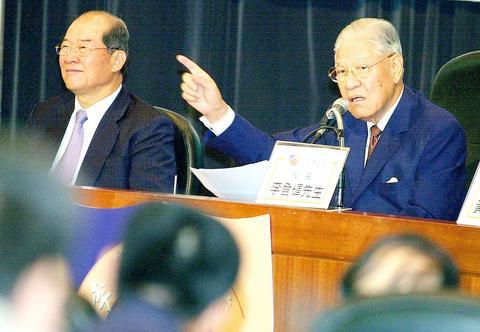Former president Lee Teng-hui (
Lee said that although President Chen Shui-bian (

PHOTO: LIAO CHENG-HUI, TAIPEI TIMES
"Some people still refuse to accept the results of the recount and even blame the national security mechanism for their loss. If they insist on casting blame like that, the election disputes probably won't be settled even in another four years. The people should really spit on them for their behavior," Lee said yesterday while addressing hundreds of students at the Lee Teng-hui School.
Lee said that the most important thing for the people and the administration now is to redouble their efforts, carry out reforms and push ahead with administrative affairs and legislative operations.
Analyzing the pan-blue camp's loss in the election, the former president said that the pan-blue alliance's defeat resulted from Chinese Nationalist Party (KMT) Chairman Lien Chan (連戰) and People First Party (PFP) Chairman James Soong (宋楚瑜) neglecting to appreciate the growth of Taiwan-centered consciousness. Lee said this failure led to the collapse of the KMT's party-state system and to the break-up of the KMT's control over its own network of supporters.
Lee said that efforts by many private social groups to promote Taiwanese national identity have helped bring about a situation in which 57 percent of the people in Taiwan, according to opinion polls, say that they identify with the notion of Taiwanese consciousness. However, Lee said that the goal is to boost that number to 75 percent within four years.
"Candidates in the next presidential election should endeavor to win at least 55 percent of the vote," Lee said.
Urging Hoklo (more commonly known as Taiwanese) members of the KMT to realize that their party is under the control of politicians who are outside the social mainstream, Lee said that ethnic Taiwanese people have remained a part of the KMT only because they have come to rely on certain benefits that they have received as a result of Mainlander leadership.
Lee said that the KMT's leaders have too much in common with the Beijing authorities and that they don't mind seeing Taiwan harmed if it suits their political interests.
Commenting on a plan that would lead to a merger between the KMT and the PFP, Lee said the plan is riddled with trickery and conspiracy and that it would silence the voices of pro-localization party members, many of whom are leery of the proposal.
Meanwhile, Lee yesterday repeated his dismissal of China's recent threats to "crush" moves toward Taiwan's independence "at any cost," saying the bellicose statements were only bluffing on China's part.
"Some reporters asked me whether I was afraid of the threats. I said there is nothing to fear because barking dogs don't bite. Those were just deceptive tricks by the Chinese," Lee said.
"Furthermore, the guidelines they issued on cross-strait relations were only issued by the very low-ranking Taiwan Affairs Office. If the threats really did come from [Chinese President] Hu Jintao (

ENDEAVOR MANTA: The ship is programmed to automatically return to its designated home port and would self-destruct if seized by another party The Endeavor Manta, Taiwan’s first military-specification uncrewed surface vehicle (USV) tailor-made to operate in the Taiwan Strait in a bid to bolster the nation’s asymmetric combat capabilities made its first appearance at Kaohsiung’s Singda Harbor yesterday. Taking inspiration from Ukraine’s navy, which is using USVs to force Russia’s Black Sea fleet to take shelter within its own ports, CSBC Taiwan (台灣國際造船) established a research and development unit on USVs last year, CSBC chairman Huang Cheng-hung (黃正弘) said. With the exception of the satellite guidance system and the outboard motors — which were purchased from foreign companies that were not affiliated with Chinese-funded

PERMIT REVOKED: The influencer at a news conference said the National Immigration Agency was infringing on human rights and persecuting Chinese spouses Chinese influencer “Yaya in Taiwan” (亞亞在台灣) yesterday evening voluntarily left Taiwan, despite saying yesterday morning that she had “no intention” of leaving after her residence permit was revoked over her comments on Taiwan being “unified” with China by military force. The Ministry of the Interior yesterday had said that it could forcibly deport the influencer at midnight, but was considering taking a more flexible approach and beginning procedures this morning. The influencer, whose given name is Liu Zhenya (劉振亞), departed on a 8:45pm flight from Taipei International Airport (Songshan airport) to Fuzhou, China. Liu held a news conference at the airport at 7pm,

AIR SUPPORT: The Ministry of National Defense thanked the US for the delivery, adding that it was an indicator of the White House’s commitment to the Taiwan Relations Act Deputy Minister of National Defense Po Horng-huei (柏鴻輝) and Representative to the US Alexander Yui on Friday attended a delivery ceremony for the first of Taiwan’s long-awaited 66 F-16C/D Block 70 jets at a Lockheed Martin Corp factory in Greenville, South Carolina. “We are so proud to be the global home of the F-16 and to support Taiwan’s air defense capabilities,” US Representative William Timmons wrote on X, alongside a photograph of Taiwanese and US officials at the event. The F-16C/D Block 70 jets Taiwan ordered have the same capabilities as aircraft that had been upgraded to F-16Vs. The batch of Lockheed Martin

GRIDLOCK: The National Fire Agency’s Special Search and Rescue team is on standby to travel to the countries to help out with the rescue effort A powerful earthquake rocked Myanmar and neighboring Thailand yesterday, killing at least three people in Bangkok and burying dozens when a high-rise building under construction collapsed. Footage shared on social media from Myanmar’s second-largest city showed widespread destruction, raising fears that many were trapped under the rubble or killed. The magnitude 7.7 earthquake, with an epicenter near Mandalay in Myanmar, struck at midday and was followed by a strong magnitude 6.4 aftershock. The extent of death, injury and destruction — especially in Myanmar, which is embroiled in a civil war and where information is tightly controlled at the best of times —